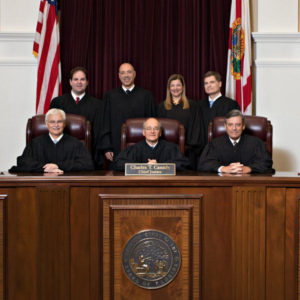AOB case is on the docket
The “new” Florida Supreme Court is attracting attention from judicial observers for reversing two decisions made by the previous court just a few months ago. While neither of the new decisions is of any great note by itself, the reversals are indicative of the changing majority of the state’s highest court- from a more liberal leaning majority to a more conservative one. With a big AOB case upcoming, we take note.
Gone are longtime Justices Barbara Pariente, Peggy Quince, and Fred Lewis, forced to step down in January because they reached mandatory retirement age. Together with remaining Justice Jorge Labarga, they often voted together and became the majority on cases that some in the business community and legislature complained showed the court’s liberal and judicial activist bent.
Now the shoe is on the other foot. The threesome was replaced by Justices Barbara Lagoa, Carlos Muñiz, and Robert Luck, all appointees of new Republican Governor Ron DeSantis (see our February story here).
Just before the departures, the old court in January handed down 4-3 decisions on Orange County, Florida vs. Rick Singh, etc, et al. and Marie Ann Glass vs. Nationstar Mortgage, LLS, etc, et al. The Court ruled in the Orange County case that there was nothing in the Florida Election Code that should prohibit Orange County from holding nonpartisan general elections for constitutional officers, such as the sheriff, property appraiser and tax collector. Justice Ricky Polston, writing for the minority that included Justices Canady and Lawson, said the majority “blatantly disregards the language of the Florida Election Code.”
The new Supreme Court this month, acting on a motion for clarification from Orange County, tossed out the old decision and ruled to uphold the previous lower court decision in the case, writing the local ordinance “is in direct conflict with the Florida Election Code.” It was a 6-1 decision, with Justice Labarga alone in the minority.
Likewise, the court’s second decision was also a 6-1 vote (with Labarga again in the minority), in the Nationstar case. It questioned whether a borrower who won a foreclosure lawsuit against Nationstar Mortgage, should be entitled to attorney fees. The former Court’s decision ruled in the borrower’s favor, relying on case law that a voluntary dismissal of an appeal allows the opposing side the right to fees. The new Court withdrew the ruling, finding that its jurisdiction in the case was “improvidently granted” and that there was no conflict of law after all in this case and another lower court ruling.
The Supreme Court later this year will hear the case of Restoration 1 vs. Ark Royal Insurance Company that we have been following closely. It will hopefully decide the question of whether insurance companies have the right to require that all parties with an insurable interest sign an Assignment of Benefits (AOB) contract, including the homeowner’s mortgage company
LMA Newsletter of 4-29-19


